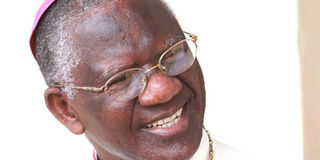Catholic church weighs in on famine scare

Tanzania Episcopal Conference (TEC) President Tarcisius Ngalalekumtwa warned that the country was facing a dire situation due to prolonged dry season
What you need to know:
- The move came as calls by a cross section of leaders mounted on the government to accept the reality and take action to forestall a crisis over the unpredictability of the situation.
- Scores of regional government officials have signalled stress arising from drought and death of livestock in their areas but the national government is yet to issue a firm direction on how to respond to the growing threat of famine.
Dar es Salaam. The prevailing drought in parts of the country has jolted the Catholic Church to issue a special pastoral letter to the faithful, asking them to pray for rain.
The move came as calls by a cross section of leaders mounted on the government to accept the reality and take action to forestall a crisis over the unpredictability of the situation.
Scores of regional government officials have signalled stress arising from drought and death of livestock in their areas but the national government is yet to issue a firm direction on how to respond to the growing threat of famine.
The TEC letter has also been issued at a time when President John Magufuli has brushed aside reports that many parts of the country were experiencing serious food shortage.
In his recent addresses at public rallies, President Magufuli has categorically denied the problem, stressing that his government would not give any food relief to anyone. He said the government did not own farms to grow food as the people.
While in Simiyu Region early in the week, President Magufuli said the hunger reports were being peddled by some media outlets at the behest of politicians and businessmen wanting to make a name and quick profits. The President claimed one businessman had imported 25,000 tonnes of maize and wanted to cajole the government into allowing the cargo in without paying tax on the pretext that the country was facing food shortage.
“I will not allow the maize into the country without the due taxes being paid,” he vowed, insisting that it was for instance improbable that pastoralists could watch thousands of their cattle die without taking any action.
In their pastoral letter, the Catholic Church, one of the strongest and most influential religious institutions in the country, warns that widespread drought could have already subjected certain areas to serious food shortages.
In the letter dispatched to bishops, Tanzania Episcopal Conference (TEC) President Tarcisius Ngalalekumtwa warned that the country was facing a dire situation due to prolonged dry season. Bishop Ngalalekumtwa who is the head of the Catholic Church in Tanzania asked bishops to organise special masses from today for congregations to pray so that it could rain in the country.
“It is the rainy and farming season in most parts of the country but we are witnessing a weather pattern that is different from what we are used to as there has been no rain to allow agricultural production to continue,” reads part of the letter signed by Bishop Ngalalekumtwa. The pastoral letter is dated January 13.
He warned also in the letter that some parts of the country have started to experience serious food shortage.
“I call for intense prayers to be held across the country. This is so that God, who protected the sons of Israel in their 40-year journey to the promised land, may look upon us with mercy and kindness,” he said.
He called for prayers for rain and blessings on agriculture so that Tanzanians would have bounty harvests and focus their attention towards serving the almighty whole heartedly and in thanks giving.
Bishop Ngalalekumtwa who serves in Iringa Diocese pleaded with the Bishops to organise pilgrimages, vigils and fasting for the same purpose.
The voice by the Catholic Church follows in other reports pointing to the uncertainty whether the country may be plunged into a famine crisis.
This is especially so after the Tanzania Meteorological Agency periodical report indicated that many parts of the country would receive below average to average rains, at least in the next two months.
Officials of the ministry of Agriculture, Livestock and Fisheries have separately in the week played down fears of a calamity, saying other than sporadic food supply strains, the country had a surplus production to tame the problem.
The ministry’s Acting Assistant Director, Crop Monitoring and Early Warning, Ms Marystella Mtalo, was quoted by the Daily News as affirming that the country had a surplus of 3 million tonnes of food. She said the pockets currently experiencing shortages was normal and not exceptional. Ms Mtalo however admitted that the number of local councils facing food deficit has increased from 43 to 53 after the earthquake that hit Kagera Region last year. Tanzania has about 150 councils. “The country is not facing food shortage. What is happening is just fear by the public due to poor rains,” said Mr Aradius Kategano, an Agricultural Development Officer at the ministry’s Crop Monitoring and Early Warning Department, in the Daily News report.
But other leaders feel President Magufuli and the technocrats at the ministry are not being honest with Tanzanians and are challenging the government to be proactive rather than defensive. Those who have raised their voices include former Prime Minister Edward Lowassa, Kigoma Urban MP and ACT-Wazalendo Party leader Zitto Kabwe, Bishop Severine Niwemugizi of Rulenge-Ngara Diocese, leader of official opposition in Parliament Freeman Mbowe and MPs Esther Bulaya amd Wilfred Lwakatare, among others.
Mr Kabwe whose party last week issued a public statement criticising the manner in which the matter was being handled has claimed that President Magufuli’s stance was informed by “the government’s miscalculation in not appropriating funds to buy emergency relief food.” According to Mr Kabwe, the National Food Reserve Agency (NFRA) was not given money to purchase enough cereals, leading to over 60 per cent fall in stock compared to last year. He quotes a Bank of Tanzania report showing that in November 2016, the NFRA was holding 90,476 tonnes of food in its strategic reserve compared to 253,655 tonnes in 2015. The NFRA stock is important in stabilising market prices in times of shortages.
Mr Lowassa and Mbowe who spoke separately during Chadema’s campaigns for civic by-elections in the Lake Zone asked the President to change his stance and begin to take measures to protect the lives of the vulnerable. “This is the area that the President really needs to listen to the voices of reason coming from other leaders,” said Mr Lowassa who defected from the ruling CCM and run against Dr Magufuli in the 2015 elections. Mbowe said they have received numerous reports from across the country from their colleagues who confirm the dire situation of food supplies.
Bishop Niwemugizi who spoke before the pastoral letter was issued told reporters in Ngara on Saturday that it would be unwise for government leaders to deny the situation. He asked Dr Magufuli to provide hope to the citizens.




